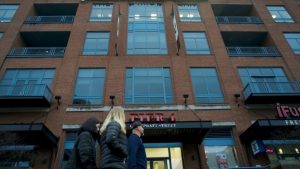
Here’s the thing: Tesla is peddling its “full self-driving” technology as a an add-on that, in theory, lets the car’s computers navigate local roads with steering, braking and acceleration.
Trouble is, “full self driving” is anything but. The feature does not allow a driver to check out and watch TikTok or take a nap on the way to work — far from it. In fact, it requires drivers to be on alert in case — and these are Tesla’s own words — the car does “the wrong thing at the worst time.”
Despite the tech’s obvious flaws, auto regulators, like the National Highway Traffic Safety Administration, have so far proven toothless against Tesla.
So where can we find a hero who’ll stand up to the world’s most valuable carmaker and its comic-book-villain-impersonating CEO?
Enter the California DMV, its long paper cape billowing in the faint wind from a single oscillating fan under dim, flickering lights.
The department recently filed a complaint with the state, essentially accusing Tesla of false advertising. Namely:
- It says the names “full self-driving” and “Autopilot” suggest the vehicles are autonomous, when they aren’t.
- Such deceptive labels could be grounds for suspending or revoking Tesla’s license to sell vehicles in the state.
Tesla can’t afford to lose California, the state where the company was founded and its biggest US market by a mile.
But for now, it’s unclear how Tesla and the DMV’s differences might be resolved, and the conflict could include lengthy litigation.
One legal scholar told Matt that a settlement could include changes to how Tesla talks about the systems on its website, a promise to avoid similar behavior in the future, or even new names for its products.
BOTTOM LINE
The Cali DMV isn’t your typical crusty government bureaucracy. Or rather, it isn’t only that. The department has a history of regulating autonomous vehicles, largely because so many of the companies developing autonomous vehicles are based in California.
Although its actions are officially limited to the state, the country has a history of following California’s lead on auto regulations because, well, it’s just that huge. When California sets a standard for, say carbon emissions, it essentially forces the whole car industry to meet those standards for their entire fleet because it wouldn’t be cost-efficient to tailor its products for one state.
Tesla’s been a tough nut for federal regulators to crack, in part because it’s in uncharted territory with EVs and semi-autonomous navigation. Perhaps the state of California, the progressive startup dreamland that Elon Musk recently snubbed by moving Tesla’s headquarters from Palo Alto to Austin, Texas, will be the one to break through.
NUMBER OF THE DAY: 5,760
‘HOUSING RECESSION’
It’s been a wild couple of years for the housing market, and it doesn’t look like it’ll be settling down into anything resembling pre-pandemic normal anytime soon.
Construction of new homes in the US slowed waaayyy down last month, with housing starts (a measure of new constriction) plunging 9.6% from June to July, and 8.1% from a year ago, according to government data released Tuesday. Let’s dig in:
- The housing numbers on Tuesday were, in a word: “Terrible,” says Ian Shepherdson, chief economist at Pantheon Macroeconomics. “In short, the whole housing sector is now in retreat.”
- The mood among home builders is souring, too, as prices for raw materials remain elevated and rising mortgage rates are putting off potential buyers.
- After scrambling to catch up to white-hot demand, builders are now cutting prices to avoid being left with a glut.
- Adding to the housing indicators Tuesday, Home Depot reported record earnings for the second quarter, thanks to elevated prices and strong demand from the DIY crowd and professional contractors. That may suggest folks are upgrading what they have rather than enter the market for a new home.
BIG PICTURE
We’ve entered a “housing recession” because of persistently high construction costs, combined with higher interest rates that influence mortgage rates, says Robert Dietz, chief economist for the National Association of Home Builders.
Potential homebuyers are backing out of deals in the highest numbers since the spring of 2020, when things felt, you know, a little shaky, existentially, for humans.
It’s a tricky transition we need to pull off here: Home prices need to come down to attract buyers, but they can’t do that until inventory goes up (or demand suddenly spikes because of some other unforeseen global phenomenon).
But builders are, reasonably, not about to keep building if no one’s buying.



